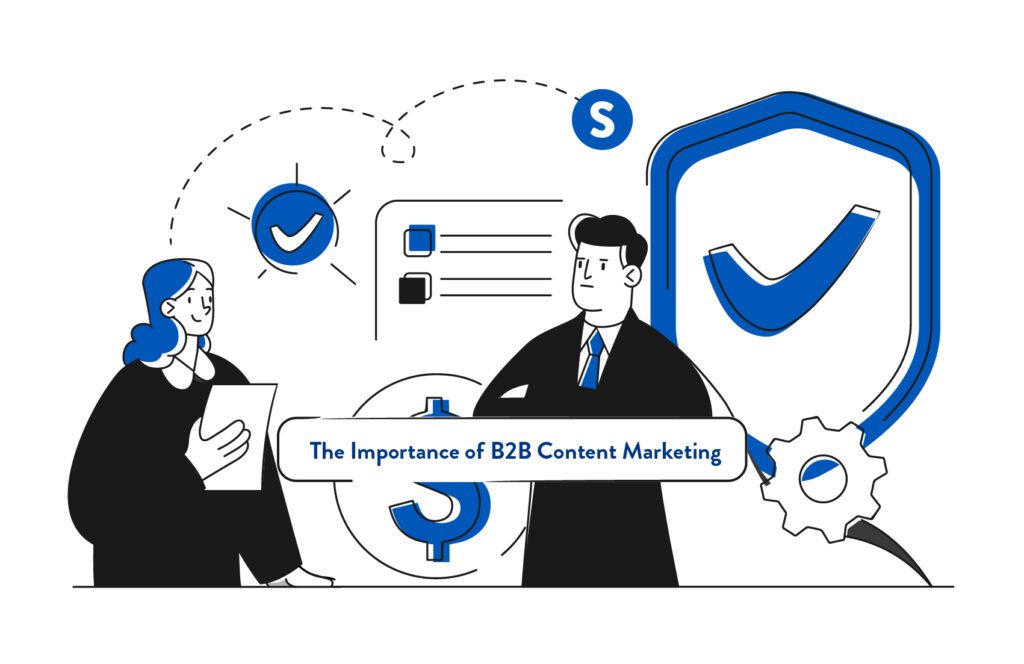
Content marketing has become a cornerstone of successful B2B advertising strategies, helping companies build brand authority, engage with their target audience, and drive meaningful business results. In the B2B landscape, where decision-making processes are often lengthy and complex, content marketing plays a unique and vital role. This article will explore the critical functions of content marketing in B2B advertising and how it can be leveraged to achieve your business objectives.
Builds Trust and Authority
In B2B advertising, trust is paramount. Potential customers are not just making personal purchases—they’re making decisions that can significantly impact their business operations. Content marketing allows companies to demonstrate their expertise and knowledge in their industry, positioning themselves as trusted authorities.
By consistently producing high-quality, informative content—such as blog posts, white papers, and case studies—you can establish your brand as a thought leader. This content educates your audience on relevant industry topics, addresses their pain points, and offers valuable solutions, which in turn builds trust and credibility.
Example: A company offering cybersecurity solutions might produce a series of in-depth articles on the latest cybersecurity threats and best practices for mitigating them. This positions the company as an expert in the field, making them a go-to resource for businesses seeking to enhance their security.
Nurtures Leads Through the Sales Funnel
B2B sales cycles are often long and involve multiple stakeholders, making lead nurturing a critical component of the advertising process. Content marketing is an effective way to engage prospects at every stage of the sales funnel, providing them with the information they need to move closer to a purchasing decision.
At the top of the funnel, content such as blog posts and social media updates can attract potential leads by addressing broad industry challenges. As leads move down the funnel, more detailed content like case studies, white papers, and webinars can help them evaluate your solutions and make informed decisions.
Example: A software company targeting enterprise clients might create a series of white papers that explore the specific challenges faced by large organizations and how their software can address those challenges. This content can be used to nurture leads who have expressed initial interest but need more information before making a decision.
Enhances SEO and Organic Reach
Content marketing plays a crucial role in improving your search engine optimization (SEO) efforts, which is essential for driving organic traffic to your website. In B2B advertising, where decision-makers often rely on online research to find solutions, appearing in search results is vital for attracting new leads.
By creating keyword-optimized content that answers common questions or solves problems faced by your target audience, you can improve your website’s visibility on search engines like Google. This not only increases the likelihood that potential customers will find you but also enhances your brand’s authority in your industry.
Example: A logistics company might produce a series of blog posts optimized for keywords related to supply chain management challenges. As these posts rank higher in search results, the company attracts more organic traffic from businesses searching for logistics solutions.
Supports Multi-Channel Campaigns
Content marketing is not confined to your website; it can be repurposed and distributed across multiple channels, making it a versatile tool in B2B advertising. Whether through social media, email marketing, or paid ads, content can help reinforce your message and engage your audience across various platforms.
For instance, a blog post can be shared on LinkedIn to reach professionals in your target industry, used as the basis for an email newsletter, or even turned into a downloadable guide promoted through paid ads. This multi-channel approach ensures that your content reaches a broader audience and remains top-of-mind for your prospects.
Example: A manufacturing firm might publish a detailed case study on their website, then promote it through LinkedIn ads targeting decision-makers in the automotive industry. The same case study could also be featured in an email campaign aimed at nurturing existing leads.
Educates and Empowers Decision-Makers
In B2B markets, decisions are often made by committees or teams, and these decisions can have significant implications for a business. Content marketing provides the resources and information that decision-makers need to make informed choices, reducing perceived risks and increasing the likelihood of a purchase.
Educational content, such as industry reports, webinars, and how-to guides, can help decision-makers understand the benefits and implications of your product or service. This content not only answers their questions but also empowers them to advocate for your solution within their organization.
Example: A financial services company could create a webinar series that explores various aspects of corporate financial management, helping CFOs and finance directors understand how their solutions can improve business outcomes.
Conclusion
Content marketing plays a pivotal role in B2B advertising by building trust, nurturing leads, enhancing SEO, supporting multi-channel campaigns, and educating decision-makers. By consistently producing valuable, informative content, B2B companies can establish themselves as industry leaders, drive engagement, and ultimately increase conversions. In a landscape where relationships and expertise are key, content marketing is an indispensable tool for achieving long-term success in B2B advertising.
To read more tips on B2B marketing strategies, check out our other B2B articles. If you’re interested in partnering with STORY to optimize your current marketing efforts, visit our website to learn more about our marketing services.